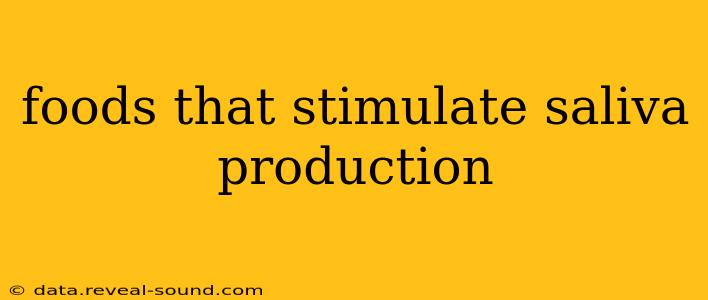Saliva, often overlooked, plays a vital role in our oral health and overall digestive process. From lubricating food for easier swallowing to initiating digestion and protecting our teeth from decay, its importance is undeniable. But what if your saliva production is low? Understanding which foods stimulate saliva production can be incredibly beneficial for maintaining oral health and improving overall well-being. This comprehensive guide explores the science behind saliva and details various foods that can help boost your production naturally.
What Causes Low Saliva Production (Xerostomia)?
Before we delve into the delicious solutions, let's briefly understand why low saliva production, medically known as xerostomia, occurs. Several factors can contribute, including:
- Medication side effects: Many medications, especially those for hypertension, depression, and anxiety, can list dry mouth as a side effect.
- Medical conditions: Conditions like Sjogren's syndrome, diabetes, and HIV can impact saliva production.
- Dehydration: Simple dehydration can significantly reduce saliva flow.
- Age: Saliva production naturally decreases with age.
- Radiation therapy: Head and neck radiation therapy can damage salivary glands.
- Smoking and alcohol consumption: These habits severely dehydrate the body and can harm salivary glands.
Foods That Stimulate Saliva Production: The Best Choices
Now, let's get to the heart of the matter: what can you eat to increase saliva production? The key is often focusing on foods that require more chewing and those with specific textures or flavors.
High-Fiber Foods:
Fruits and vegetables rich in fiber stimulate chewing, prompting increased saliva production. Apples, carrots, celery, and broccoli are excellent examples. The mechanical stimulation of chewing is a crucial factor.
Sour and Tart Foods:
The natural acidity of these foods triggers your salivary glands. Think lemons, limes, cranberries, and even certain types of yogurt. The tangy flavor acts as a natural stimulant.
Chewy Foods:
Similar to high-fiber options, chewy foods like nuts, seeds, and even certain types of meat encourage extended chewing, directly impacting saliva production. The act of chewing itself is a powerful stimulant.
Foods with Strong Flavors:
Intense flavors, whether spicy, savory, or sweet, can stimulate your salivary glands. This is why foods like ginger, cinnamon, and even strong cheeses can be effective. The sensory experience triggers a response.
Foods High in Water Content:
Staying hydrated is crucial. Watermelon, cucumbers, and other high-water-content fruits and vegetables indirectly contribute to increased saliva production by ensuring adequate hydration.
What about acidic foods? Can they harm my teeth?
While acidic foods can stimulate saliva production, it's crucial to consume them in moderation and practice good oral hygiene. The increased saliva helps neutralize the acid, but prolonged exposure can still damage tooth enamel. Rinsing your mouth with water after consuming acidic foods is highly recommended.
Are there any drinks that help increase saliva?
Water is the most effective drink for increasing saliva production, as it combats dehydration, a major cause of dry mouth. Unsweetened herbal teas, while not directly stimulating, can also contribute to hydration.
Can I increase saliva production naturally without changing my diet?
While dietary changes are the most effective approach, maintaining good oral hygiene, staying hydrated, and reducing stress can also contribute to improved saliva production.
What if dietary changes don't help my dry mouth?
If you consistently experience dry mouth despite dietary adjustments, it's crucial to consult a dentist or doctor. Underlying medical conditions or medication side effects could be the cause. They can offer a proper diagnosis and recommend the best course of action.
This comprehensive guide offers a deeper understanding of foods that stimulate saliva production and the importance of addressing dry mouth. Remember, consistent good oral hygiene practices, coupled with a saliva-boosting diet, are key to maintaining optimal oral health.
